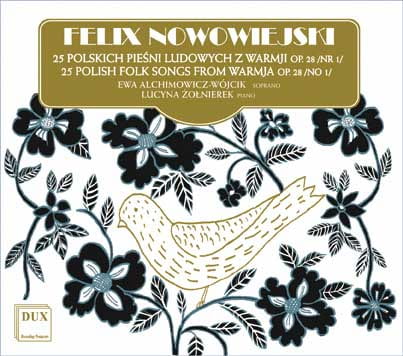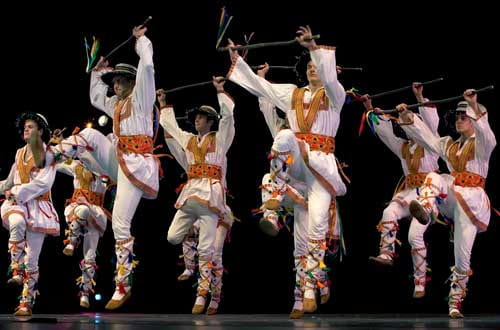Polish Music Reference Center Newsletter Vol. 14, no. 5
PMC News
Review: Polish Music Spring
By Barbara Kraft
The Polish Music Center’s annual spring concert at the USC Thornton School of Music was a tour de force of compositional and performance virtuosity, featuring Lutosławski’s Partita for Violin and Piano and Penderecki’s Second Sonata for Violin and Piano. The Penderecki was performed by internationally-celebrated violinist Midori Goto who also wrote the program notes for that work and the Lutosławski. Ms. Goto, a renowned interpreter of modern music, joined the Thornton faculty in 2006 where she holds the Jascha Heifetz Chair in Violin.
Juxtaposed with these towering 20th century masterpieces were short solo piano works by two of Poland’s most celebrated nineteenth century composers, Frederic Chopin and Ignacy Jan Paderewski. These piano works were arranged for strings and piano by Marek Zebrowski (pictured below with Midori Goto), program director of the Polish Music Center (PMC).
 “I thought these two hugely dramatic, late 20th century pieces would be well served by surrounding them with shorter pieces from a different era,” Mr. Zebrowski stated. “Beautiful and charming, the smaller chamber works provide contrast and reprieve from the intense concentration demanded of the listener by the Lutosławski and the Penderecki.”
“I thought these two hugely dramatic, late 20th century pieces would be well served by surrounding them with shorter pieces from a different era,” Mr. Zebrowski stated. “Beautiful and charming, the smaller chamber works provide contrast and reprieve from the intense concentration demanded of the listener by the Lutosławski and the Penderecki.”
The concert opened with Chopin’s Nocturne in C-sharp minor, Opus posthumous and Paderewski’s Nocturne, Op. 16 no. 4, arranged for cello and piano, and eloquently performed by Lars Hoefs and Mr. Zebrowski.
Witold Lutosławski’s Partita for Violin and Piano (1984) completed the first half of the program. Lutosławski considered the Partita one of his most important compositions. Commissioned by the Saint Paul Chamber Orchestra for Pinchas Zukerman and Marc Neikrug, the work was subsequently made into a version for violin and orchestra at the request of Anne-Sophie Mutter in 1988.
 In her program notes Midori describes the Partita as a masterpiece for violin and piano. “It contains everything one can imagine in a deeply-moving musical work: the life within this music is so powerful that both to play it and to listen to it is an overwhelming experience.” The bravura performance of Jason Issokson, violin, and Jiayi Shi, piano (pictured at left), bore testament to Midori’s words.
In her program notes Midori describes the Partita as a masterpiece for violin and piano. “It contains everything one can imagine in a deeply-moving musical work: the life within this music is so powerful that both to play it and to listen to it is an overwhelming experience.” The bravura performance of Jason Issokson, violin, and Jiayi Shi, piano (pictured at left), bore testament to Midori’s words.
The lives of both Lutosławski and Penderecki were deeply affected by World War II and the German occupation, which resulted in the devastation of Poland’s cultural heritage. This tragic time was evocatively captured in the film The Rape of Europa which shows the leveling of every Polish library floor by floor and the destruction of Warsaw on Hitler’s orders. The aftermath for Poles was half a century of Communist government and their heavy-handed cultural policies, culminating in the declaration of martial law in 1981. If the use of a world of pain and troubles is to school the intelligence and make it a soul—as the 19th century English poet John Keats believed—this sentiment finds its ultimate expression in the music of Lutosławski and Penderecki.
 Evoking a simpler and more elegant time, the second half of the concert opened with the “beautiful and charming smaller chamber works” referred to above, like a mint in between courses to clear the palate. Paderewski’s Mélodie, Op. 16 no. 2 and Chopin’s Nocturne in E-flat major, Op. 55 no. 2, arranged for violin, cello and piano by Mr. Zebrowski, were performed by Joel Pargman, violin, Lars Hoefs, cello (pictured at right), and Marek Zebrowski.
Evoking a simpler and more elegant time, the second half of the concert opened with the “beautiful and charming smaller chamber works” referred to above, like a mint in between courses to clear the palate. Paderewski’s Mélodie, Op. 16 no. 2 and Chopin’s Nocturne in E-flat major, Op. 55 no. 2, arranged for violin, cello and piano by Mr. Zebrowski, were performed by Joel Pargman, violin, Lars Hoefs, cello (pictured at right), and Marek Zebrowski.
Penderecki’s compelling Second Violin Sonata was performed by the inestimable Midori who considers the Sonata one of the greatest duo works written for violin and piano at the turn of the 21st century. “The Sonata is an epic,” Midori writes, “beginning with the birth of ideas that are developed as the work progresses and then gradually terminated at the conclusion.”
Midori’s performance was spellbinding, nearly to the point of pain. Her playing had the qualities of a Greek tragedy and reminded this writer of Zoe Wanamaker’s electrifying 1999 New York performance as Sophocles’ Electra. Midori’s artistry defines her greatness, and her single-minded drive and rapturous intensity kept the audience spellbound in Penderecki’s mesmerizing Sonata.
Barbara Kraft is a public relations specialist and producer, writer and narrator of KCRW’s hour-long documentary on Segerstrom Hall, “Transforming O.C.” She has contributed to The Hudson Review, The Michigan Quarterly, The Canadian Theatre Review, Ohio University Press, et al. She has just completed a book-length memoir entitled The Death of Anais Nin: Lux Aeterna.
Polish Constitution Day
History Of The Polish Constitution
by Marek Zebrowski
Aliena laudatis, vestra ignoratis…
 Constitutions are documents containing basic principles and laws that govern a nation or a state, where the powers and duties of the government and guarantees of certain rights for the citizens are enumerated. During the past millennium, the institution of the feudal monarchy in the Western world gradually evolved towards an arrangement where various branches of government jointly undertake the task of governing. Such a transition created the need for a legal instrument that would regulate the functions of the state, delineate the rights of its citizens, and enshrine them in a form acceptable to all who were governed by it. The first such document was Britain’s Magna Carta, first drafted in 1215 and substantially revised over the next one hundred years. Since that time, it has safeguarded—to a greater or lesser extent—the relationship between the English Crown and the Parliament, also serving as the foundation of a historical process that led to the development of constitutional law.
Constitutions are documents containing basic principles and laws that govern a nation or a state, where the powers and duties of the government and guarantees of certain rights for the citizens are enumerated. During the past millennium, the institution of the feudal monarchy in the Western world gradually evolved towards an arrangement where various branches of government jointly undertake the task of governing. Such a transition created the need for a legal instrument that would regulate the functions of the state, delineate the rights of its citizens, and enshrine them in a form acceptable to all who were governed by it. The first such document was Britain’s Magna Carta, first drafted in 1215 and substantially revised over the next one hundred years. Since that time, it has safeguarded—to a greater or lesser extent—the relationship between the English Crown and the Parliament, also serving as the foundation of a historical process that led to the development of constitutional law.
Written constitutions are a relatively modern phenomenon. The two earliest examples date only from the late eighteenth century, and come from two countries that were very far apart geographically, politically and historically. Separated by continents and oceans, one was a prestigious and great commonwealth undergoing a period of decline, the other a federation of newly independent colonies that would become the most powerful country in the modern world. The constitutions of these two countries not only shared many notable similarities in their development and their final form, but they were also ratified almost at the same time, the first on 17 September 1787, the other on 3 May 1791. They were the Constitution of the United States of America and the Constitution of the Commonwealth of Poland-Lithuania
To continue reading this article, please click here.
Musical Celebrations
Los Angeles, CA
 A concert celebrating the Polish Constitution of May 3, 1791 will be held on May 4th at UCLA’s Schoenberg Hall. The afternoon will start off with welcoming remarks and award presentation by the Honorable Paulina Kapuścińska, Consul General of the Republic of Poland in Los Angeles. A recital by UCLA Professor Juliana Gondek, soprano with Yevgeniy Milyavskiy, piano and the USC String Quartet (Armen Derkevorkian & Ely Karr, violins, John Stulz, viola and Mingwei Zhao, cello) will follow. The program will feature works by: Karol Szymanowski, Ludomir Różycki, Feliks Nowowiejski, Andrzej Panufnik, Witold Lutosławski, Mieczysław Karłowicz, & Stanisław Moniuszko. There will be a reception after the concert, hosted by the Consulate General of Poland in L.A.
A concert celebrating the Polish Constitution of May 3, 1791 will be held on May 4th at UCLA’s Schoenberg Hall. The afternoon will start off with welcoming remarks and award presentation by the Honorable Paulina Kapuścińska, Consul General of the Republic of Poland in Los Angeles. A recital by UCLA Professor Juliana Gondek, soprano with Yevgeniy Milyavskiy, piano and the USC String Quartet (Armen Derkevorkian & Ely Karr, violins, John Stulz, viola and Mingwei Zhao, cello) will follow. The program will feature works by: Karol Szymanowski, Ludomir Różycki, Feliks Nowowiejski, Andrzej Panufnik, Witold Lutosławski, Mieczysław Karłowicz, & Stanisław Moniuszko. There will be a reception after the concert, hosted by the Consulate General of Poland in L.A.
SUNDAY, 4 MAY 2008 at 4 PM
Recital: Juliana Gondek
Schoenberg Hall, UCLA
405 Hilgard Avenue, Westwood
FREE ADMISSION
Parking: $8, Parking Structure 2 (Hilgard Ave. & Westholme Ave.)
For more information, please call (310) 442-8500 ext.109
www.losangeleskg.polemb.net
Pittsburgh, PA
The Lira Ensemble of Chicago – famous for concerts of Polish music, song, and dance across the US and Poland – will perform in Pittsburgh for the first time, on Sunday afternoon, May 4, 2008 at Heinz Hall, in observance of May 3rd/Polish Constitution Day. “A Polish Musical Celebration” will feature Polish patriotic music, music of Polish master composers – Frederick Chopin and Stanisław Moniuszko – as well as spirited folk songs and dances from various regions of Poland, performed in colorful, authentic folk costumes. The concert will be performed by the Lira Orchestra, Lira Singers, Lira Dancers and is narrated in English so that it will be enjoyed by all. The narrations explain the meanings and history behind the music and dance.
 The Lira Ensemble is America’s only professional performing arts company specializing in Polish music, song and dance and is based at Loyola University Chicago as artist-in-residence. Lucyna Migala is artistic director and general manager of the company and narrates Lira concerts. Distinguished conductor Paul Dijkstra will lead the orchestra and singers. Lira’s choreographer and dance director is Iwona Puc.
The Lira Ensemble is America’s only professional performing arts company specializing in Polish music, song and dance and is based at Loyola University Chicago as artist-in-residence. Lucyna Migala is artistic director and general manager of the company and narrates Lira concerts. Distinguished conductor Paul Dijkstra will lead the orchestra and singers. Lira’s choreographer and dance director is Iwona Puc.
Sunday, May 4, 2008 at 3:30pm
“A Polish Musical Celebration”
Heinz Hall – 600 Penn Avenue, Pittsburgh, PA
Parking: $6, Theatre Square Garage
Tickets: Call Lira: 800-547-5472 / 773-508-7040 or
Call Heinz Hall: 412-392-4900 ($30-$65)
www.pittsburghsymphony.org
Washington, DC
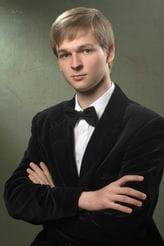 The Polish Embassy proudly presents a piano recital by Jacek Kortus on May 2nd in celebration of Constitution Day. Jacek Kortus is the youngest finalist of the 15th International Chopin Piano Competition in Warsaw. He will present a program of music by Chopin and Liszt. A meet the artist reception will follow the concert
The Polish Embassy proudly presents a piano recital by Jacek Kortus on May 2nd in celebration of Constitution Day. Jacek Kortus is the youngest finalist of the 15th International Chopin Piano Competition in Warsaw. He will present a program of music by Chopin and Liszt. A meet the artist reception will follow the concert
Friday, MAY 2, 2008 at 7:00pm
Piano recital by Jacek Kortus
Embassy of the Republic of Poland
2640 16th Street NW, Washington D.C.
RSVP: culture@polemb.us or 202-234-3800 ext. 2140
News
Blechacz US Tour
 In October 2005, a twenty year old Polish virtuoso made an electrifying international debut and won the gold medal at the 15th International Frederic Chopin Piano Competition in Warsaw. The first Polish laureate in the twenty years since Krystian Zimmerman won this prestigious competition, Rafał Blechacz (pictured at left) is now on his first US tour. From April 25 – May 12, he will concertize in Kalamazoo, MI (April 27 – see below), Vancouver, WA (May 2), and Santa Rosa (May 8), San Jose (May 4), and San Francisco, CA (May 11 – see below). The program of his recitals will be: Mozart – Sonata in D Major, KV 311; Debussy – Estampes; Szymanowski – Variations in B-flat Minor, Op. 3; and Chopin – 24 Preludes, Op. 28.
In October 2005, a twenty year old Polish virtuoso made an electrifying international debut and won the gold medal at the 15th International Frederic Chopin Piano Competition in Warsaw. The first Polish laureate in the twenty years since Krystian Zimmerman won this prestigious competition, Rafał Blechacz (pictured at left) is now on his first US tour. From April 25 – May 12, he will concertize in Kalamazoo, MI (April 27 – see below), Vancouver, WA (May 2), and Santa Rosa (May 8), San Jose (May 4), and San Francisco, CA (May 11 – see below). The program of his recitals will be: Mozart – Sonata in D Major, KV 311; Debussy – Estampes; Szymanowski – Variations in B-flat Minor, Op. 3; and Chopin – 24 Preludes, Op. 28.
The Golden Medal at the Chopin Competition has opened the door for Blechacz to the most prestigious concert halls all over the world. The pianist was invited to perform at the Warsaw Philharmonic Hall (March 2006), the Tchaikovsky Hall of the Moscow Conservatory with the Marinsky Orchestra under Valery Gergiev (May 2006), Tonhalle in Zurich (September 2006), 12 recitals in major concert halls in Japan including Tokyo Opera City (November 2006), Concertgebouw in Amsterdam (December 2006), Herkules Saal in Munich (March 2007), Wigmore Hall in London (April 2007), Auditorio Nacional in Madrid (May 2007), more performances in Japan including Suntory Hall in Tokyo (May-June 2007), and the Palais des Beaux Arts in Brussels (September 2007). The artist’s performances at summer festivals have included: Ruhr, Verbier and La Roque d’Antheron (July-August 2006), and were enthusiastically received by the critics. Rafal Blechacz’s calendar is now fully booked two years in advance and includes performances at the major cultural centers of Europe, the North America and the Far East.
For his concert on Sunday, May 11 at 7:00 pm in the Florence Gould Hall of the Herbst Theatre in San Francisco, concert organizers have created a “Polonia Discount”: tickets, normally $38, will be only $30. This is available only by phone at (415) 392-4400. The patron just has to mention the “Polonia Discount” to receive it. [Thanks to Leszek Szalek for this information]
Piotr Moss Premieres
 France is the venue for two orchestral world premieres and Warsaw is the venue for the Polish premiere of a chamber work by Piotr Moss (pictured at right), certainly one of Poland’s most prolific composers of classical music. The cities in the province of Picardie (Chàteau-Thierry, Vervins, and Amiens) will hear the composer’s Partita for Orchestra on May 17, 18 and 21respectively, performed by the Orchestre de Picardie under the direction of Pascal Verrot. Commissioned by the orchestra, the Partita for Orchestra is published by Leduc in Paris.
France is the venue for two orchestral world premieres and Warsaw is the venue for the Polish premiere of a chamber work by Piotr Moss (pictured at right), certainly one of Poland’s most prolific composers of classical music. The cities in the province of Picardie (Chàteau-Thierry, Vervins, and Amiens) will hear the composer’s Partita for Orchestra on May 17, 18 and 21respectively, performed by the Orchestre de Picardie under the direction of Pascal Verrot. Commissioned by the orchestra, the Partita for Orchestra is published by Leduc in Paris.
Warsaw will hear Moss’ Offenbachiana for two cellos on May 16as part of the annual spring festival, Warsaw Musical Meetings (Warszawskich Spotkań Muzycznych). Tomasz Strahl and Aleksandra Ohare are the featured soloists. It should be pointed out that Mr. Strahl has been instrumental in popularizing Zygmunt Stojowski’s Concertstück for cello and orchestra in Poland. This includes an archival recording with the National Polish Radio Orchestra in Katowice and several performances with other symphonic orchestras. Next season, Strahl will perform the Stojowski with the orchestras of Jelenia Góra and Białystok.
Finally, on May 25 at the Théâtre des Champs-Elysées in Paris we have the premiere of Le voyageur au-dessus de la mer de montagnes, the next work in the orchestral cycle, Cinq tableaux de Caspar Davied Friedrich, performed by the Orchestre des Concerts Lamoureux under the baton of Youtaka Sado.
[JH]
Ochlewski Composition Competition
 PWM (Polish Music Editions) has announced details for the 6th edition of the Tadeusz Ochlewski Composition Competition. In 2008 the subject of the competition is a composition for the solo harpsichord. The competition is open to Polish nationals, who were under 30 years of age on December 31, 2007. A composer can submit only one composition and the length of the work is limited to 7 minutes. The submitted work has to be original and could not have been previously performed or awarded. The submission deadline for compositions is July 30, 2008. The jury, consisting of Gośka Isphording (harpsichord player and member of The Roentgen Connection), Wojciech Widłak (composer and chair of composition department at the Kraków Music Academy) and Andrzej Kosowski (Editor-in-chief of PWM), will award one prize and one honorary mention. As is the tradition, the winning work will be published by PWM. For complete regulations and details, please visit the PWM website.
PWM (Polish Music Editions) has announced details for the 6th edition of the Tadeusz Ochlewski Composition Competition. In 2008 the subject of the competition is a composition for the solo harpsichord. The competition is open to Polish nationals, who were under 30 years of age on December 31, 2007. A composer can submit only one composition and the length of the work is limited to 7 minutes. The submitted work has to be original and could not have been previously performed or awarded. The submission deadline for compositions is July 30, 2008. The jury, consisting of Gośka Isphording (harpsichord player and member of The Roentgen Connection), Wojciech Widłak (composer and chair of composition department at the Kraków Music Academy) and Andrzej Kosowski (Editor-in-chief of PWM), will award one prize and one honorary mention. As is the tradition, the winning work will be published by PWM. For complete regulations and details, please visit the PWM website.
Stanko: Komeda Tribute
On May 19th in New York City, “A Concert Tribute to Krzysztof Komeda” will celebrate the film music of a composer who helped establish Eastern Europe’s underground jazz scene in the late 1950s and went on to write the haunting scores for some 40 films, including Rosemary’s Baby. This concert will feature the Tomasz Stanko Quartet with special guest Billy Harper. This concert is part of the Jazz Score series at the MoMA.
 Tomasz Stanko, a Polish trumpeter and composer, and Billy Harper, an American tenor saxophonist, are considered two of the most acclaimed jazz improvisers in the world. Stanko also leads his quartet in performing his own jazz compositions for the Polish cinema. The Tomasz Stanko Quartet includes Marcin Wasilewski, piano, Slawomir Kurkiewicz, bass, and Michal Miskiewicz, drums.
Tomasz Stanko, a Polish trumpeter and composer, and Billy Harper, an American tenor saxophonist, are considered two of the most acclaimed jazz improvisers in the world. Stanko also leads his quartet in performing his own jazz compositions for the Polish cinema. The Tomasz Stanko Quartet includes Marcin Wasilewski, piano, Slawomir Kurkiewicz, bass, and Michal Miskiewicz, drums.
For Stanko, as for other artists living in Communist Poland, jazz represented “freedom, Western culture, a different way of life.” It was performed clandestinely in cellars and at dance parties in cities like Łódż, where students like Roman Polanski and Jerzy Skolimowski turned the city’s now-legendary film school into a hotbed of artistic experimentation and political dissent. As a prelude to this special concert, two of Komeda’s best scores will be heard when Polanski’s Knife in the Water and Skolimowski’s Le Départare are screened. Komeda’s scores presented in the film series also include two shorts: Polanski’s The Fat and the Lean and Kijowicz’s animated Banner.
The Museum of Modern Art’s Jazz Score (April 16 – September 15) is a celebration of the greatest jazz scores ever written for film. The series includes a broad Polish presentation, featuring mostly music by Krzysztof Komeda among other films with music by Duke Ellington, Miles Davis, Dizzy Gillespie, Modern Jazz Quartet, Thelonius Monk, Toru Takemitsu, and Wynton Marsalis; two live performances. Polish posters for films with jazz scores are also featured in a simultaneous international gallery exhibition, among many other artifacts.
The introduction of contemporary jazz to film scoring in the mid-twentieth century brought fresh forms of sophistication and innovation to world cinema. Until the 1950s, jazz had primarily been used in film as atmospheric or incidental music or during show-stopping musical numbers. Jazz Score celebrates the groundbreaking collaborations between filmmakers, composers, and musicians who, by experimenting with new forms and techniques, have radically transformed both art forms – jazz and the cinema – from the 1950s to the present day.
(Josh Siegel, curator of Jazz Score)
May 19, 2008 at 7:30pm
Tomasz Stanko Quartet & Billy Harper in concert
MoMA – Theater 1
11 West 53 Street, New York City, NY
MoMA info: (212) 708-9400
www.moma.org/exhibitions
[Information from Polish Cultural Institute in NY]
Student Focus: Kuba Cichocki
 Kuba Cichocki, a brilliant young Polish jazz pianist, has won a place at the New School of Contemporary Music and Jazz in New York. He was born into a family of music teachers on August 5, 1984 in Chodzież, Poland, an area renowned for internationally-renowned music workshops. These circumstances encouraged Kuba’s interest in music, especially jazz. From the age of 17 he took part in the Jazz Workshops in Chodzież, where he studied with Wojciech Niedziela and Jan Jarczyk.
Kuba Cichocki, a brilliant young Polish jazz pianist, has won a place at the New School of Contemporary Music and Jazz in New York. He was born into a family of music teachers on August 5, 1984 in Chodzież, Poland, an area renowned for internationally-renowned music workshops. These circumstances encouraged Kuba’s interest in music, especially jazz. From the age of 17 he took part in the Jazz Workshops in Chodzież, where he studied with Wojciech Niedziela and Jan Jarczyk.
Having studied in a non-musical high school, it was not until he applied to the Fryderyk Chopin School of Music in Warsaw and was accepted into Wojciech Majewski’s piano class in 2003 that Kuba began his formal music education. He has since been awarded the following prizes: 2nd Prize – II Warsaw Jazz Pianists Festival 2004; 1st Prize (soloist) – IX Jazz Standards Competition, Siedlce 2005; 1st Prize (member of “Bednarska Five”) – X Jazz Standards Competition, Siedlce 2006; “Best jazz group” award (Cichocki/Borowiecki/Rasz Trio) – “Nadzieje Warszawy” Festival 2006; “Best jazz soloist” – “Nadzieje Warszawy” Festival 2006; Individual award – Krokus Jazz Festival 2006, Żielona Góra.
Now graduated, Kuba collaborates with some of the most respected jazz musicians in Poland, including Michał Urbaniak, Urszula Dudziak, Zbigniew Namysłowski, Zbigniew Wegehaupt, and Aga Zaryan. Since 2007 he has been a member of trumpeter Jerzy Małek’s Quintet – a CD recently recorded with the group is about to be released.
This year, Kuba applied to and was accepted by the New School for Jazz and Contemporary Music in New York. This is what the artist has to say about his desire to study at the New School:
I really want to challenge and develop my jazz and learning skills in general, as well as have authentic contact with the environment, the traditions and the great innovators of Jazz, experiences that are not available to me in Poland.
What I can bring in return? Poland has a unique pianistic tradition and approach to composition which may interest and enrich American students. These traditions, when mixed with what I hope to learn at the New School, will help me to develop a language of my own which I hope will be of value and interest not only to me but to my listeners. I would like to be an ambassador for Polish jazz but at the same time learn and apply new influences and ideas from America.
If you are interested in learning more about Kuba or supporting his efforts to attend the New School, please contact the Polish Music Center at polmusic@thornton.usc.edu with “Kuba Cichocki” in the subject line.
A Director For Kraków Phil
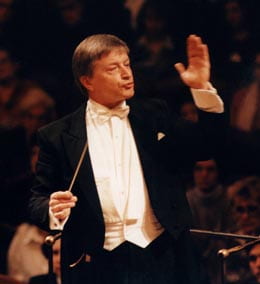 After over two years, the Kraków Philharmonic has finally appointed a new chief-director. Tadeusz Strugała was appointed by Bogdan Zdrojewski, Poland’s Minister of Culture, and Strugała took his post on April 4, 2008.
After over two years, the Kraków Philharmonic has finally appointed a new chief-director. Tadeusz Strugała was appointed by Bogdan Zdrojewski, Poland’s Minister of Culture, and Strugała took his post on April 4, 2008.
Tadeusz Strugała is one of the great Polish conductors. He is a graduate of the Wrocław Music Academy. Between 1979 and 1990 he was the assistant director and conductor of the National Philharmonic in Warsaw. He served as artistic director of Kraków Philharmonic from 1981 to 1986. For over 20 years he has been on faculty of the Wrocław Music Academy.
Kraków Opera News
Laco Adamik has been appointed chief stage director and Tomasz Tokarczyk has been appointed musical director of the Kraków Opera.
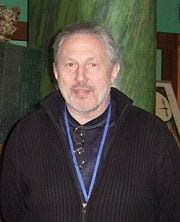 Laco Adamik, a film and theater director, is of Slovak origin. He studied architecture in Bratislava and directing at the Film Academy in Prague. In the early 1970’s he settled in Poland. He frequently directs for Polish Television channels, primarily in the TV theater shows. As an operatic director he debuted in 1977 with Puccini’s La Boheme in the Łódź Opera. He has also worked with National Opera in Warsaw and Silesian Opera in Bytom. He worked with the Kraków Opera previously, during the 1990s.
Laco Adamik, a film and theater director, is of Slovak origin. He studied architecture in Bratislava and directing at the Film Academy in Prague. In the early 1970’s he settled in Poland. He frequently directs for Polish Television channels, primarily in the TV theater shows. As an operatic director he debuted in 1977 with Puccini’s La Boheme in the Łódź Opera. He has also worked with National Opera in Warsaw and Silesian Opera in Bytom. He worked with the Kraków Opera previously, during the 1990s.
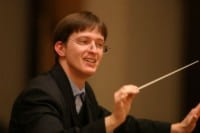 Tomasz Tokarczyk is a graduate of the Kraków Music Academy, with degrees in conducting and violin performance. He has conducted the Warsaw Radio Orchestra and the Rzeszów, Kraków, Szczecin and Jelenia Góra Philharmonic Orchestras, as well as the Tarnów Chamber Orchestra.
Tomasz Tokarczyk is a graduate of the Kraków Music Academy, with degrees in conducting and violin performance. He has conducted the Warsaw Radio Orchestra and the Rzeszów, Kraków, Szczecin and Jelenia Góra Philharmonic Orchestras, as well as the Tarnów Chamber Orchestra.
Opus Award
 Polish Radio and Polish Television have established an “Award of the Public Media” in the fields of literature (COGITO) and contemporary music (OPUS). The award was created with notable input from the Society of Polish Writers, the Polish PEN Club and the Polish Composer’s Union. The award juries will be composed of the Members of each of these organizations.
Polish Radio and Polish Television have established an “Award of the Public Media” in the fields of literature (COGITO) and contemporary music (OPUS). The award was created with notable input from the Society of Polish Writers, the Polish PEN Club and the Polish Composer’s Union. The award juries will be composed of the Members of each of these organizations.
The awards will be given each year to a Polish composer for a musical composition written and performed for the first time in the previous year. Similar rules also apply to book releases – the work must be written in Polish and published in the year prior to the award. The candidates may be voted in by cultural institutions, book publishers, recording companies, and by the members of the jury, who will choose a single winner in each category.
The award consists of a statue and a monetary prize in the amount of 200,00PLN (approx. $90,000USD). The 4th of May is the deadline for applications this year. To find out more about these new awards please visit www.nagrody-mediow-publicznych.pl.
Polish Artists At The Met
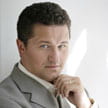 Four Polish singers will perform at the Metropolitan Opera in New York during the upcoming 2008/2009 season. Tenor Piotr Beczała will be featured in three roles, as Edgar in Lucia di Lammermoor, as Leński in Eugene Onegin and as Prince Mantui in Rigoletto. In Onegin he will be joined by Aleksandra Kurzak as Gilda.
Four Polish singers will perform at the Metropolitan Opera in New York during the upcoming 2008/2009 season. Tenor Piotr Beczała will be featured in three roles, as Edgar in Lucia di Lammermoor, as Leński in Eugene Onegin and as Prince Mantui in Rigoletto. In Onegin he will be joined by Aleksandra Kurzak as Gilda.
 Contralto Ewa Podleś returns to the Metropolitan Opera stage this fall as well. Although highly regarded in the US, she has not sung on Met stage since her debut in the 1980s. Between September and October she will play Cieca in La Gioconda by Ponchielli.
Contralto Ewa Podleś returns to the Metropolitan Opera stage this fall as well. Although highly regarded in the US, she has not sung on Met stage since her debut in the 1980s. Between September and October she will play Cieca in La Gioconda by Ponchielli.
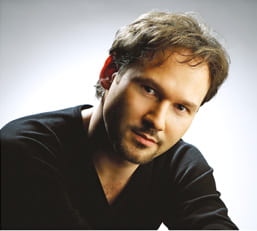 Mariusz Kwiecień is one of the artists who constantly performs with the Metropolita Opera. In December and January he will once again sing as Marcello in Puccini’s La Bohme, and several weeks later as Henry Ashton in the second run of the Lucia di Lammermoor. He will share the stage with one of the Met’s most renowned duos: Anna Netrebko (Lucia) and Rolando Villazon (Edgar).
Mariusz Kwiecień is one of the artists who constantly performs with the Metropolita Opera. In December and January he will once again sing as Marcello in Puccini’s La Bohme, and several weeks later as Henry Ashton in the second run of the Lucia di Lammermoor. He will share the stage with one of the Met’s most renowned duos: Anna Netrebko (Lucia) and Rolando Villazon (Edgar).
 After his Met debut last year in Aida, Andrzej Dobber will return to the Met stage in October singing the role of Germont in Verdi’s La Traviata.
After his Met debut last year in Aida, Andrzej Dobber will return to the Met stage in October singing the role of Germont in Verdi’s La Traviata.
The last time to so many Polish artists performed in New York was during the 1980s, when the Metropolitan Opera engaged Teresa Kubiak, Teresa Żylis-Gara, Wiesław Ochman and conductor Kazimierz Kord.
Awards
Fryderyki 2008
 The Polish Phonographic Academy has announced the recipients of the 2008 Fryderyk Awards. As has been the tradition for several years now, the popular music awards ceremony will be held separately from the classical/jazz categories. The following are the winners in the Classical and Jazz categories.
The Polish Phonographic Academy has announced the recipients of the 2008 Fryderyk Awards. As has been the tradition for several years now, the popular music awards ceremony will be held separately from the classical/jazz categories. The following are the winners in the Classical and Jazz categories.
Classical Music
- Album of the Year – Choral and Oratorio Music: Józef ZEIDLER – Musica Sacromontana, Polskie Radio
- Album of the Year – Early and Baroque Music: Jasnogórska Muzyka Dawna Vol. 14 / Ciemne jutrznie [Early Music from Jasna Góra Vol. 14/Dark Lauds] (Anna Mikołajczyk, Magdalena Szewczyk, Piotr Olech, Krzysztof Szmyt, Mirosław Borczyński, CONCERTO POLACCO directed by Marek Toporowski), DUX
- Album of the Year – Chamber Music: LUTOSŁAWSKI Piano Duo, Polskie Radio
- Album of the Year – Solo Music: Fryderyk CHOPIN – Preludia (Rafał Blechacz), Deutsche Grammophon
- Album of the Year – Symphonic and Concerto Music: Mieczysław KARŁOWICZ; Emil MŁYNARSKI – Polish Spirit (Nigel Kennedy and the Polish Chamber Orchestra, Jacek Kaspszyk, cond.), EMI Classics
- Album of the Year – Contemporary Music: Paweł ŁUKASZEWSKI – Sacred Music, Musica Sacra Edition
- Album of the Year – Vocal Recital, Opera, Operetta, Ballet: Karol SZYMANOWSKI – Songs. Ops 31 & 49 (Anna Mikołajczyk and Edward Wolanin), DUX
- Phonographic Debut of the Year: Anna MIKOŁAJCZYK (Szymanowski: Songs – Vocal Recital), DUX
- Composer of the Year: Paweł SZYMAŃSKI
- Outstanding Recording of Polish Music: Fryderyk CHOPIN – Preludia (Rafał Blechacz), Deutsche Grammophon
Jazz
- Jazz Album of the Year: Piotr WOJTASIK – Circle (SO Jazz Records – Stowarzyszenie Orkiestra Jazzowa),
- Jazz Musician of the Year: Piotr WOJTASIK
Lifetime Achievement
Since year 2000 there is also a special Golden Fryderyk award for lifetime achievement in music. Previous recipients of the award include Marek Grechuta, Jacek Kaczmarski, Władysław Szpilman and Irena Santor. This year this special award went to jazz musician, Jerzy “Duduś” Matuszkiewicz and the director of Wrocław Opera, Ewa Michnik.
For more information about the Fryderyk Award, and to find a complete list of nominated and honored artists please visit http://www.fryderyk2008.pl/.
Golka & Blechacz At Gilmore Festival
 Polish-American pianist Adam Golka has been named one of this year’s Gilmore Young Artists. As a part of his prize, he will perform Franz Liszt’s Piano Concerto No. 1 with the Grand Rapids Symphony several times over the course of the 2008 Irving S. Gilmore International Keyboard Festival (April 20 – May 13). He will also give solo recitals at the First Congregational Church in St. Joseph, MI; Riviera Theatre in Three Rivers, MI; Stetson Chapelat Kalamazoo College in Kalamazoo, MI; and the Vicksburg Performing Arts Center in Vicksburg, MI.
Polish-American pianist Adam Golka has been named one of this year’s Gilmore Young Artists. As a part of his prize, he will perform Franz Liszt’s Piano Concerto No. 1 with the Grand Rapids Symphony several times over the course of the 2008 Irving S. Gilmore International Keyboard Festival (April 20 – May 13). He will also give solo recitals at the First Congregational Church in St. Joseph, MI; Riviera Theatre in Three Rivers, MI; Stetson Chapelat Kalamazoo College in Kalamazoo, MI; and the Vicksburg Performing Arts Center in Vicksburg, MI.
The Gilmore Young Artist Award is presented every two years to exceptional American pianists 22 years old and younger who demonstrate the talent and drive to become successful concert pianists. Between 1990 and 2004, 20 remarkable young pianists received the Gilmore Young Artist Award. Each musician receives a $15,000 grant to further his or her musical career and educational development. The artists are nominated by leaders in the field of music, and nominees are not told of their inclusion in this noncompetitive selection process. The philosophy of noncompetition is a tribute to Irving S. Gilmore, who spent his wealth on others – particularly pianists – quietly and without fanfare.
 Golka shares the marquis of this Festival with the winner of the 2005 Chopin Competition in Warsaw, Polish pianist Rafał Blechacz. He played a solo recital on April 27th at the Dalton Center Recital Hall in Kalamazoo, MI, with a program including Szymanowski’s Variations in B-flat Minor, Op. 3 and Chopin’s 24 Preludes, Op. 28.
Golka shares the marquis of this Festival with the winner of the 2005 Chopin Competition in Warsaw, Polish pianist Rafał Blechacz. He played a solo recital on April 27th at the Dalton Center Recital Hall in Kalamazoo, MI, with a program including Szymanowski’s Variations in B-flat Minor, Op. 3 and Chopin’s 24 Preludes, Op. 28.
For all Festival and Award details, please visit: www.thegilmoreiscoming.com. For an article on the Festival, please visit: www.mlive.com.
Supersonic Award
 DUX has received the April 2008 “Supersonic Award” from Pizzicato, a classical music magazine in Luxembourg. The award-winning CD was Szymanowski – Piano Works / Joanna Domańska, piano (DUX 0615). This disc features the following works by Karol Szymanowski (1882-1937): Métopes Op. 29, Studies Op. 33, Piano Sonata No. 3 Op. 36, and Polish dances (1926).
DUX has received the April 2008 “Supersonic Award” from Pizzicato, a classical music magazine in Luxembourg. The award-winning CD was Szymanowski – Piano Works / Joanna Domańska, piano (DUX 0615). This disc features the following works by Karol Szymanowski (1882-1937): Métopes Op. 29, Studies Op. 33, Piano Sonata No. 3 Op. 36, and Polish dances (1926).
Didur Vocal Competition
Australian soprano, Elena Xanthoudakis, has won the Grand Prix of the 2nd Adam Didur International Opera Voice Competition, organized by the Silesian Opera in Bytom. Ms. Xanthoudakis also took first place in the best female voice category. The best male voice award went to Liudas Mikalauskas from Lithuania.
The competition attracted 46 young singers from Poland, Germany, South Korea, Australia, Lithuania, Ukraine, China and the United States. According to the regulations the participants had to be under the age of 30.
2nd place in the female voice category went to Lina Liu (China) and in the male category to Jarosław Kitala (Poland). 3rd prizes went to Lee Fun Hee (South Korea) in female category and Stanisław Kuflyuk (Ukraine) in male voice category.
The international jury consisted of: Jose Ferreira-Lobo, Gioacchino Gitto, Józef Kański, Ingrid Kremling-Domański, Igor Kushpler, Bogdan Paprocki, Maja Schermerhorn, Tadeusz Serafin, Romuald Tesarowicz, Stefania Toczyska, and Wiesław Ochman (chairman).
The competition’s patron, Adam Didur (1873 – 1946), was an outstanding bass. For 25 years he was a soloist with the Metropolitan Opera in New York, and he started the Silesian Opera after World War II. For more information about the festival and results, please visit: www.opera-slaska.pl.
Festivals
Gaude Mater Festival
 For many years the Sacred Music Festival “Gaude Mater” has been the musical symbol of Częstohowa, Poland. This year’s 18th edition will tie in with the European Year of the Cross-culture dialogue. From May 1 to May 6 several churches and concert halls in Częstochowa will host music of the three great religions of the world: Christianity, Judaism and Islam. Artists will gather from all around the world, including Armenia, Austria, France, Israel, Morocco, Germany, United States, Sweden, Ukraine and Great Britain. Invited artists will present a multitude of musical styles and traditions, from gospel to synagogue music, from Moroccan and Gyspsy sacred songs to Ormian monody, from the Russian orthodox tradition to works by great masters of old, like Bach or Mozart. Polish music is also an important part of the festival, and works by Krzysztof Penderecki, Henryk Mikołaj Górecki and Roman Maciejewski will sound during the festival.
For many years the Sacred Music Festival “Gaude Mater” has been the musical symbol of Częstohowa, Poland. This year’s 18th edition will tie in with the European Year of the Cross-culture dialogue. From May 1 to May 6 several churches and concert halls in Częstochowa will host music of the three great religions of the world: Christianity, Judaism and Islam. Artists will gather from all around the world, including Armenia, Austria, France, Israel, Morocco, Germany, United States, Sweden, Ukraine and Great Britain. Invited artists will present a multitude of musical styles and traditions, from gospel to synagogue music, from Moroccan and Gyspsy sacred songs to Ormian monody, from the Russian orthodox tradition to works by great masters of old, like Bach or Mozart. Polish music is also an important part of the festival, and works by Krzysztof Penderecki, Henryk Mikołaj Górecki and Roman Maciejewski will sound during the festival.
Another tradition of the festival is premieres, and this year will be no exception. The audience will hear works by the laureates of the “Musica Sacra” Composition Competition alongside well established Polish and British composers, conducted by Stephen Layton.
The special event included this year will be the Polish-Swedish concert, under the honorary patronage of the Ambassador of the Kingdom of Sweden. The Polish chamber choir “Schola Cantorum Gedanensis” will sing Polish and Swedish music under the direction of Eric Ericson, a 90 year-old world class conductor, who will end his long musical career with this concert.
For more information about the festival and a detailed program please visit the official website www.gaudemater.pl.
Warsaw Music Meetings
 The 22nd edition of the Warsaw Music Meetings will start on May 10 and will last for eight days. During the festival there will be a great variety of concerts, from full size symphony orchestras to simple chamber music evenings. Among the invited performers are: Polish Radio Orchestra with Łukasz Borowicz, Kiev Philharmonic Chamber Orchestra with Krzysztof Słowiński, Polish Chamber Choir with Jan Łukaszewski, Wratislavia Chamber Orchestra with Jan Stanienda and special guest – Alla Francesca Ensemble from Paris. During the Warsaw Music Meetings audiences will also hear great soloists such as: Jadwiga Rappé, Tadeusz Wielecki, Edward Wolanin, Tomasz Strahl, Marta Boberska, Patrycja Piekutowska, Beata Bilińska, Michał Górczyński, Aleksandra Ohar, Ryszard Groblewski, Tomasz Woźniak, Bartłomiej Kominek and Dagna Sadkowska. As is tradition, the Wilanów String Quartet will perform a concert during the festival; this year the program includes works by Krzysztof Penderecki, Tadeusz Baird and Franz Schubert.
The 22nd edition of the Warsaw Music Meetings will start on May 10 and will last for eight days. During the festival there will be a great variety of concerts, from full size symphony orchestras to simple chamber music evenings. Among the invited performers are: Polish Radio Orchestra with Łukasz Borowicz, Kiev Philharmonic Chamber Orchestra with Krzysztof Słowiński, Polish Chamber Choir with Jan Łukaszewski, Wratislavia Chamber Orchestra with Jan Stanienda and special guest – Alla Francesca Ensemble from Paris. During the Warsaw Music Meetings audiences will also hear great soloists such as: Jadwiga Rappé, Tadeusz Wielecki, Edward Wolanin, Tomasz Strahl, Marta Boberska, Patrycja Piekutowska, Beata Bilińska, Michał Górczyński, Aleksandra Ohar, Ryszard Groblewski, Tomasz Woźniak, Bartłomiej Kominek and Dagna Sadkowska. As is tradition, the Wilanów String Quartet will perform a concert during the festival; this year the program includes works by Krzysztof Penderecki, Tadeusz Baird and Franz Schubert.
Other composers represented this year include: Philip Glass, Robert Schuman, Zygmunt Krauze, Witold Lutosławski, Krzysztof Penderecki, Tadeusz Wielecki, Tadeusz Baird, Edward Elgar, Anna Ignatowicz-Glińska, Joachim Olkuśnik, Paweł Łukaszewski, Aleksander Kościów, Marta Pokrzywińska, Władysław Słowiński and others.
The program of the festival and more specific information are available at www.wsm.art.pl.
Blumental Festival – Israel
 2008 marks the 10th annual Felicja Blumental International Music Festival and the centenary of the birth of Polish/Brazilian pianist, Felicja Blumental. This year’s festival will take place on May 19-24 and will feature a variety of events, from recitals and musical spectaculars to films, lectures and even a specially commissioned ballet – something for everyone.
2008 marks the 10th annual Felicja Blumental International Music Festival and the centenary of the birth of Polish/Brazilian pianist, Felicja Blumental. This year’s festival will take place on May 19-24 and will feature a variety of events, from recitals and musical spectaculars to films, lectures and even a specially commissioned ballet – something for everyone.
The annual Felicja Blumental International Festival was named after the pianist in 1999 by the Tel Aviv Museum of Art, Israel’s most dynamic cultural centre, and is a long-anticipated event in the Tel Aviv cultural calendar. Under the Artistic direction of Annette Celine (daughter of Felicja Blumental) and the Executive Direction of Avigail Arnheim, the festival brings together musicians from around the globe as well as showcasing home grown talents from Israel. It has been described as “an event that is not afraid to dare and to innovate, to introduce unknown names and bring out Israeli artists that for no just cause were left in the shade.”
The Festival will open on Monday, May 19 with a special lecture by Prof. Mordechai Omer. The lecture will be followed by a tribute to Felicja Blumental in the form of piano extravanganza, featuring award-winning pianists Alessio Bax and Lucille Chung (Canada), among others.
The schedule of events will include films by Bruno Monsaingeon on the amazing violinist David Oistrakh and legendary pianist Sviatoslav Richter, a specially commissioned ballet choreographed to the music of Hekel Tavares, the Concerto in Brazilian Forms (recorded by Ms Blumental and available on Brana Records) and a musical extravaganza by Brazilian ensemble Rabo de Lagartixa, featuring the sensational 7 string guitarist, Marcello Gonsalves.
Back by popular demand, the Armonico Consort under the direction of Christopher Monks will return to the festival to perform Purcell’s Dido and Aeneas on period instruments and the week will close with a Gala Evening featuring the award winning New Israeli Vocal Ensemble.
For further details and the full schedule of events, visit www.blumentalfestival.com. To read about the corresponding recording that has been released, see below.
Special Report From Poland: Part II
By Gary Fitelberg
(To read the first part in this series, please visit the April Newsletter here)
While In Warsaw – Chamber Concert
 While in Warsaw preparing my film tribute, “Grzegorz Fitelberg: Recollections & Reflections,” I was asked to an invitation-only, salon-style chamber concert sponsored by WARSZAWSKIE TOWARZYSTOW MUZYCNE (WTM). This concert performance took place on March 27, 2008 at 6:00 p.m. at the famous Pałac Szustra located at ul. Morskie Oko 2. Getting there was no easy task. With probably Warsaw’s worst cab driver, combined with the worst traffic jam in Warsaw’s history, I arrived belatedly at the moment of the performance’s conclusion – just after the applause of the last piece and greetings and hugs by the invited guests for the two performers, soloists and virtuosos.
While in Warsaw preparing my film tribute, “Grzegorz Fitelberg: Recollections & Reflections,” I was asked to an invitation-only, salon-style chamber concert sponsored by WARSZAWSKIE TOWARZYSTOW MUZYCNE (WTM). This concert performance took place on March 27, 2008 at 6:00 p.m. at the famous Pałac Szustra located at ul. Morskie Oko 2. Getting there was no easy task. With probably Warsaw’s worst cab driver, combined with the worst traffic jam in Warsaw’s history, I arrived belatedly at the moment of the performance’s conclusion – just after the applause of the last piece and greetings and hugs by the invited guests for the two performers, soloists and virtuosos.
When those in attendance all turned around, much to our mutual bewilderment, they saw a virtual stranger in their midst. They were all surprised to see me standing there, quite embarrassed, but proceeded to give me a very warm welcome. One guest whose name I did not know told me that her father or mother knew my relative Grzegorz Fitelberg personally and played together with him in one of his orchestras. One of the performers also told me the same story regarding her mother.
After a brief introduction to these invited guests, an impromptu repeat performance of the last pieces of the concert ensued at the behest and initiative of the performers. Featured guest performers for the evening were violinist Henryka Tronek of Germany (pictured at right) and her accompanist, pianist Mariana Aivazova of Greece.
The evening’s program had consisted of Italian, Russian, German and Czech composers. First was the featured composer, Gaetano Pagnani (1731 – 1798) and his Preludium i Allegrio, followed by Nikolai Rimsky-Korsakov’s Chanson Arabe and Georg Friedrich Händel’s Sonata No. 4. After the brief pause, the audience was applauding a delightful performance of two pieces by composer Antoni Dvorak (1841-1904): Slowionski Taniec and Sonatina, Op. 100, at which point I finally arrived.
Upon my arrival, the audience fortunately received a surprise reprise of the Dvorak as a special treat by the two featured guest artists. The gentleman who served as host of the Pałac Szustra then hailed me a cab and I returned to my hotel promptly. Despite the delay, the evening was well worth the time and trouble for the private performance and special treat.
Moral of the Story: All’s well that ends well.
Int’l Folk Dance In Warsaw
The American group “International Folk Dance Ensemble” (IFDE, pictured above in a Romanian dance) performed in Warsaw on March 15, 2008 at Jósef Sowiński Park on Elekcyjna Street 17. The event was organized by the Ochota Cultural Center and the S. Zeromski Cultural Center.
Combining ethnic traditions and exquisite costuming, Brigham Young University’s International Folk Dance Ensemble showcases dance styles of the world, and features the traditions of the United States at international folklore festivals. Over the past decade, the ensemble has visited 29 countries spanning four continents. As an emissary of the United States and American traditions, the group has become internationally famous at the most prestigious folk dance festivals abroad, where it performs with many of the world’s finest dance companies.
During the month of May 2008, the group made an international tour of Budapest, Hungary; Bratislava, Slovakia; Prague, Czech Republic; Krakow (10th), Lublin (12th), Warsaw (15th); and last but definitely not least Minsk, Belarus.
The ensemble was founded in 1956 and since celebrated its 50 Golden Jubilee Anniversary during 2006. The group boasts 47 musicians, singers, dancers and technicians, who together form one of the most unique groups of performing artists in the United States of America (USA). IFDE’s musical ensemble, Mountain Strings, not only provides an accompaniment for the dancers, but also performs show-stopping traditional music.
According to the group’s website:
With a beautiful array of ethnic costumes, the International Folk Dance Ensemble presents a concert program of dances from more than a dozen nations, including Ukraine, Russia, Korea, Poland, Mexico, and the United States. Since 1964 the ensemble has represented the United States and American culture at folk dance festivals throughout the world, including the festival held in conjunction with the 1988 Seoul Olympics and the festivals in Haifa, Israel; Confolens, France; and Billingham, England. In addition, the group regularly presents its international repertoire throughout the United States and Canada. Regardless of focus— international or American—the BYU Folk Dance Ensemble is acclaimed by thousands for their skillful dancing and energy.
This ensemble combines dance and music in a very colorful auditory and visual sensation, together as one.
Discography
Blumental Anniversary Collection
 Brana Records Collection Vol. 1
Brana Records Collection Vol. 1
Including works by Villa-Lobos, Hekel Tavares, Czerny, Haydn, Ries, Beethoven
Felicja Blumental, piano
Orchestras include: Filharmonica Triestina conducted by Luigi Toffolo, Torino Symphony Orchestra conducted by Alberto Zedda, Brno Philharmonic conducted by Jiri Waldhens, Prague Symphony Orchestra conducted by Alberto Zedda, Vienna Chamber Orchestra conducted by Helmut Froschauer, Salzburg Chamber Orchestra conducted by Theodore Guschlbauer and the Wüttemberg Chamber Orchestra conducted by Jörg Faerber
Brana Records BR0029
2008 marks the centenary of the birth of pianist Polish/Brazilian pianist Felicja Blumental, whose recordings are restored on Brana Records. A special 5 CD Box set is now available highlighting the best selling titles by Felicja Blumental from the catalogue. Brana Recordsexists to preserve the legacy of pianist, Felicja Blumental whose rare and exciting recordings feature on 28 restored recordings. The repertoire on this special limited edition box set is a reminder of Felicja Blumental’s talents as a pianist and as a champion of the lesser known piano works from the late 18th and early 19th century, which she sought out together with her husband, Markus Mizne, whose dazzling art prints feature on all Brana CD covers.
Grella-Mozejko On Atma
 Le Livre des Mélancolies
Le Livre des Mélancolies
Piotr Grella-Mozejko – …River to the ocean…; Jean Lesage – Le Livre des Mélancolies; and Tim Brady – Slow Dances
Jean-Guy Boisvert, clarinet, and Quatuor Bozzini
ATMA Classique ACD22552
[ArkivMusic.com, Canadian Music Centre, and Archambault.ca]
This disc features works for clarinet and string quartet by contemporary Canadian composers. Born in Poland, Piotr Grella-Mozejko has lived in Canada since 1989. …River to the ocean…was commissioned by clarinetist for this CD, Jean-Guy Boisvert, in 1996. Montreal composer Jean Lesage was born in 1958 and his piece Le livre des mélancolies (1999) was commissioned by the Société de musique contemporaine du Québec (SMCQ). Tim Brady is a composer and guitarist who has created music in a wide range of genres ranging from chamber and orchestral to electroacoustic works, chamber opera, contemporary dance scores, jazz, and free improvisation. Slow Dances (1999) was commissioned by Jean-Guy Boisvert and the Quatuor Bozzini.
Particularly interested in the music of his contemporaries, Jean-Guy Boisvert has frequently premiered new works by Canadian composers. Moving freely from avant-garde events to traditional concerts, the Quatuor Bozzini was characterized by the Irish Times as a “group which gets its teeth into music: quiet or loud, fast or slow, these Canadian musicians play with compelling engagement.”
[from the Arkivmusic.com website]
Maupin’s Early Reflections
 The Bennie Maupin Quartet: “Early Reflections”
The Bennie Maupin Quartet: “Early Reflections”
Bennie Maupin – bass clarinet, tenor & soprano saxophones, alto flute
Michał Tokaj – piano
Michał Barański – bass
Łukasz Żyta – drums, percussion
Hania Chowaniec-Rybka – voice
Cryptogramophone CG137( 2008)
Jazz legend Bennie Maupin follows his highly acclaimed 2006 CD Penumbra, with Early Reflections, a beautiful recording by Maupin’s European quartet featuring pianist Michał Tokaj, and guest vocalist Hania Chowaniec-Rybka. Early Reflections is another brilliant effort from this artist best known for his work with Miles Davis, Herbie Hancock, Horace Silver, The Headhunters, and many others. It features a new version of Maupin’s classic composition, The Jewel in the Lotus.
Katyń 1940
 This 4-CD album was released by the Polish Radio Phonographic Agency on April 7, 2008. It is a collection of documentaries, documents and archival radio broadcasts regarding the murders of Polish officers by the Soviet NKWD in April and May of 1940. One of the special treats on the CD is an excerpt of a broadcast by Radio Free Europe from 1951 about the efforts Polish officials to locate information about the missing officers from 1941-1943. The broadcast was by Jan Nowak-Jeziorański with special guests: General Władysław Anders, General Tadeusz Bór-Komorowski and Major Józef Czapski, one of the very few officers who survived being imprisoned by the NKWD. The names of the murdered soldiers from Kozielsko, Ostaszkowo and Starobielsko are also read by: Maja Komorowska, Wojciech Wysocki, Wiktor Zborowski and chairman for the Polish Radio, Krzysztof Czabański. This list, as well as photographs from the exhumation site, are printed in the included booklet.
This 4-CD album was released by the Polish Radio Phonographic Agency on April 7, 2008. It is a collection of documentaries, documents and archival radio broadcasts regarding the murders of Polish officers by the Soviet NKWD in April and May of 1940. One of the special treats on the CD is an excerpt of a broadcast by Radio Free Europe from 1951 about the efforts Polish officials to locate information about the missing officers from 1941-1943. The broadcast was by Jan Nowak-Jeziorański with special guests: General Władysław Anders, General Tadeusz Bór-Komorowski and Major Józef Czapski, one of the very few officers who survived being imprisoned by the NKWD. The names of the murdered soldiers from Kozielsko, Ostaszkowo and Starobielsko are also read by: Maja Komorowska, Wojciech Wysocki, Wiktor Zborowski and chairman for the Polish Radio, Krzysztof Czabański. This list, as well as photographs from the exhumation site, are printed in the included booklet.
The 3rd CD includes musical works dedicated to or inspired by the event in Katyń: Epitafium Katyńskie [Katyń Epitaph] by Andrzej Panufnik, Pieśń Rodzin Katyńskich[Song of the Katyń Families] opus 81 by Henryk Mikołaj Górecki, Via Crucis by Eugeniusz Rudnik and “Agnus Dei” from Polish Requiem (mvmt. V) by Krzysztof Penderecki. The 4th CD contains mp3-compressed materials from the first two discs, translated into English.
For more information about this collection please visit: http://polskieradio.pl/raf/dokument/record.aspx?id=39179 .
Szymanowski On Polskie Radio
 Karol Szymanowski – 4 Symphonies
Karol Szymanowski – 4 Symphonies
Karol Szymanowski: Overture in E Major Op. 12; 1st Symphony in F Minor Op. 15; 2nd Symphony in B Major Op. 19; 3rd Symphony “Pieśń o nocy” Op. 27; 4th Symphony “Koncertująca” Op. 60; Mazurka Op. 50 no. 13; Mazurka Op. 62 no. 1; Two interviews with Szymanowski by Czech Radio.
Performers: Camerata Silesia, Chamber Choir of the Polish Radio in Kraków, Izabela Kłosińska – soprano, Ewa Kupiec – piano, Polish Radio National Symphony Orchestra, Danish Radio Symphony Orchestra, Karol Szymanowski
Conductors: Grzegorz Fitelberg, Kazimierz Kord, Włodzimierz Siedlik, Anna Szostak
PRCD 108182
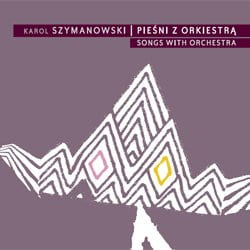 Karol Szymanowski – Songs with orchestra
Karol Szymanowski – Songs with orchestra
Karol Szymanowski: Three Fragments from Jan Kasprowicz’s Poems Op. 5 for voice and piano; Penthesilea to words by Stanisław Wyspiański Op. 18; Love Songs of Hafiz to words by Hans Bethge Op. 26; Songs of Infatuated Muezzin to words by Jarosław Iwaszkiewicz Op. 42; Słopiewnie [Word Songs] to words by Julian Tuwim Op. 46; Five Kurpian Songs Op.58
Performers: Urszula Kryger – mezz-soprano, Iwona Sobotka – soprano, Polish Radio National Symphony Orchestra
Consuctors: Gabriel Chmura, Kazimierz Kord
PRCD 1088
New from DUX
 Borodin – Mahler – Shostakovitch. Piano Quartet & Quintets
Borodin – Mahler – Shostakovitch. Piano Quartet & Quintets
Alexander Borodin: Piano Quintet in C Minor; Gustav Mahler: Piano Quartet in A Minor; Dmitri Shostakovich: Piano Quintet in G Minor Op. 57
Camerata Quartet: Włodzimierz Promiński – 1st violin, Andrzej Kordykiewicz – 2nd violin, Piotr Reichert – viola, Roman Hoffmann – cello, Jolanta Münch – piano
DUX0629
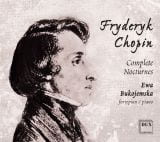 Fryderyk Chopin. Complete Nocturnes
Fryderyk Chopin. Complete Nocturnes
Frederic Chopin: Complete Nocturnes
Ewa Bukojemska – piano
DUX 0619 / 0620
 Felix Nowowiejski: 25 Polish Folk Songs from Warmja
Felix Nowowiejski: 25 Polish Folk Songs from Warmja
25 Polish Folk Songs from Warmja, op. 21 no 8: * Meszek w lesie * Siodoj, siodoj, moje kochanie * Mnioł jedan łojciec trzy córy * Łuloj, łuloj gołómbeczku * A przed wroty * Dziewczyno moja (I) * Dziewczyno moja (II) * Za stodołó modry kaneń * Słóneczko wysoczko * Zolnierz bardzo zranióny * Stoji w polu dómeczek * Mom jo córki * Furały jeskółki * Sztery mnile za Warszawó *Z tamty stróny jeziora * Ach, mój Boże, gody jido * Kiedy mak zakście * Gdzie też ty Jonku pojedziesz * Wolołbym jo kosó kosić * Jebłóneczka * W polu łogródeczek * Naszo Anula * Siedzi jestrzambek na ziśni * Zilk na zogónie * Buła babula
Ewa Alchimowicz-Wójcik – soprano & Lucyna Żołnierek – piano
DUX 0604
Anniversaries
Born This Month
- 2 May 1846: Zygmunt NOSKOWSKI (d. 23 July 1909), composer
- 2 May 1913: Florian DABROWSKI, composer and teacher
- 5 May 1819: Stanislaw MONIUSZKO (d. 4 June 1872), composer – Father of Polish Opera
- 12 May 1805: Jan Nepomucen BOBROWICZ (d. 2 November 1881), guitarist and composer
- 17 May 1943: Joanna BRUZDOWICZ, composer living in France, 2003 PMC Paderewski Lecturer
- 18 May 1905: Wlodzimierz ORMICKI, composer, conductor, music theoretician
- 20 May 1903: Jerzy FITELBERG (d. 25 April 1951), composer, son of the famous conductor
- 28 May 1836: Jan KARLOWICZ (d. 14 June 1903), father of composer Mieczyslaw
- 29 May 1903: Marian NEUTEICH (d. 1943, Warsaw), composer and cellist
- 31 May 1932: Boguslaw MADEY, conductor and composer
- 31 May 1913: Irena GARZTECKA (d. 14 November 1963), composer and pianist
Died This Month
- 1 May 1948: Marcel POPLAWSKI (b. 1882), composer and teacher, studied law and engineering before turning to composition
- 4 May 1896: Józef SIKORSKI (b. 1813), composer and music theorist
- 6 May 1892: Nikodem BIERNACKI (b. 1826), violinist and composer
- 10 May 1964: Hanna SKALSKA-SZEMIOTH (b. 29 April 1921), composer, student of Sikorski
- 13 May 1958: Eugeniusz MOSSAKOWSKI (b. 1885), opera singer (baritone)
- 21 May 1848: Felix JANIEWICZ (b. 1762), violinist, conductor, and composer
- 21 May 2007: Adam FALKIEWICZ (b. 4 Jan 1980), composer
- 23 May 1957: Alicja SIMON (b.1879), musicologist
- 25 May 1917: Edward RESZKE (b. 1853), opera singer (bass), brother of Jan
- 31 May 2006: Franciszek WYBRAŃCZYK (b. 28 May 1934), co-founder and former director of the Sinfonia Varsovia Orchestra, organizer and promoter of Polish and European music
